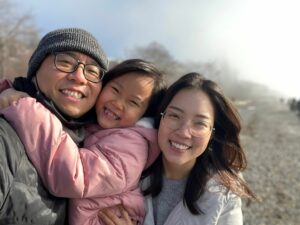 Jeehoon Kim has recently finished an eight-year journey of PhD studies at Wycliffe College in Toronto. We asked him to reflect on this long journey and the next chapter of his life.
Jeehoon Kim has recently finished an eight-year journey of PhD studies at Wycliffe College in Toronto. We asked him to reflect on this long journey and the next chapter of his life.
On one level, my experiences were typical: I had the privilege of learning from great scholars and practitioners, some who became my mentors; I had many discussions with friends and colleagues about the Bible, God, Theology, and what all of that might mean for the world; and I observed what a seminary can do to equip future leaders.
But I also learned that it came with a price. For one, I lost a handful of hair (maybe two, alas). My wife took a long break from her career and took on the burden of upholding our home. My degree demanded significant funds from my parents and I accumulated debt from student loans. There probably is some humour in knowing that after all the years of toil and tears, all we are now waiting for is a single piece of paper, that may or may not hang in my office one day. Of course, I’d like to think that the sacrifices will amount to some good that will benefit the Kingdom of God.
My dissertation, in some sense, is about becoming wiser. It re-examines the relationship between Proverbs and Ecclesiastes which frequently has been understood to be at opposite ends of wisdom thought. Proverbs is typically understood as the book of traditional wisdom while Ecclesiastes is a representative of protest or crisis literature. Instead of dichotomizing these two books, I argued that when we take the canonical links between the two books seriously, they are closer than previously understood. They can and perhaps should be understood within a harmonious relationship that implies growth. In other words, wisdom grows and we as readers of wisdom can grow as well.
Reading Proverbs and Ecclesiastes within a harmonious relationship that implies growth means that wisdom is more than simply learning the rules. Indeed there are important rules and principles, but as we grow older (perhaps balder) we learn that it’s not that simple. There are exceptions to the rule, limitations in our wisdom (Eccl 9:13-16), injustices in the world (Eccl 2:16; 7:15), inconsistencies in life, and at times, regardless of how hard we try, there are things that are “crooked and cannot be made straight” (Eccl 1:15). The great teacher Qoheleth even wants us to stare at death (Eccl 7:2). He wants us to make these difficult observations. This is part of being wise.
These two books together teach us that remaining faithful to God is still paramount even if we struggle in our reality. Acknowledge that the beginning and end of wisdom is to fear God (Prov 1:7; Eccl 12:13), keep his commandments, and if you can, enjoy life but with the appropriate amount of acknowledgement that life’s hebel is also near (8:14-15). Living wisely is to “navigate” through these complexities of life within one’s faith to God (Prov 1:5).
Easier said than done. But thankfully, and hopefully, we have people around us to help us through this life. I have had my three-fold cord that does not easily break (Eccl 4:12). I have been supported by my professors, intellectually, personally, and pastorally. I could not have made it without these great teachers who offered wise words that were, at times, goads and nails (Eccl 12:11).
Through my friends and colleagues I have learned to become a better listener, to be more patient, to be humble, and to acknowledge that I don’t always have the right answer (I rarely do). I’ve learned that there are more things I don’t know about than I actually do; and that’s ok. Through them, I’ve learned to manage my anxieties a bit better and became more compassionate to others but also to myself.
I have also had great support from Northwest. Here, I have met the most amazing, encouraging, and enthusiastic people. The support my family and I received has been overwhelming. Encouragement, prayer and countless discussions with colleagues was critical for getting me through the finishing stages of my degree. I am grateful to be part of a community that knows to kneel before making a stand. I have learned and continue to learn from these people.
When I was born, my father named me Jee-hoon (智熏) which consists of two Chinese characters: wisdom and burning. I’m not sure if my name is supposed to mean that I am “burning with wisdom” or “burning away all my wisdom” but I’d like to think that my father wanted me grow wiser as I age. I’m not there yet. Maybe I’m somewhere in between, but hopefully, in due time, I will be (Eph 4:13).